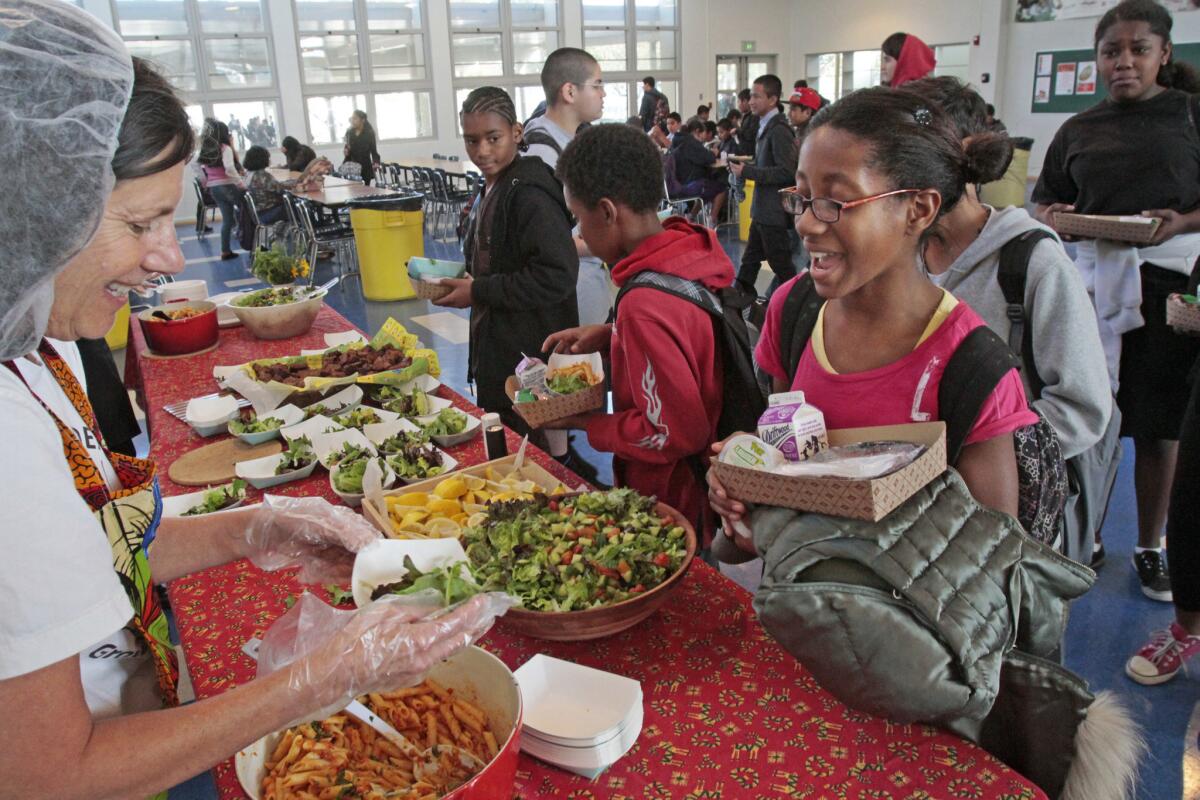Audit finds mismanagement, ethical breaches in L.A. Unified food services

Volunteer Renee Meshul, left, serves Randee Mervin from the garden table at lunch.
- Share via
The Los Angeles school district’s massive food services program is riddled with mismanagement, inappropriate spending and ethical breaches, according to an internal audit released Wednesday.
The 33-page audit by the district’s Office of the Inspector General reviewed L.A. Unified’s revamped food procurement system, which was introduced five years ago to supply the nation’s second-largest school food operation. Eight major vendors were awarded $750 million in food contracts spread over five years.
Under the new system, auditors found increased food prices, bloated inventories, incompatible computer systems to order food, a “haphazard” menu development process and insufficient controls over spending. The audit also found increased meal participation and greater innovation and flexibility.
L.A. Unified Supt. Ramon Cortines said district officials have already moved to tighten fiscal controls and spending oversight.
“The district takes these findings very seriously,” he said in a statement with Thelma Melendez de Santa Ana, head of the educational services office.
Cortines said he was particularly concerned about the lax oversight of a school meal marketing program funded by food vendors. The program was created in 2010 by Dennis Barrett, the former food services director who now works for the New York City Department of Education.
To win the contracts under the new system, vendors agreed to contribute more than $1.5 million to promote the district’s healthful food initiatives and educate students about nutrition.
The marketing efforts helped draw national attention to the district’s cutting-edge efforts to shift to healthier school food with lower fat, sodium and sugar — including praise from First Lady Michelle Obama.
But the audit raised questions about some of the vendor payments: $117,500 to philanthropist Meg Chernin’s Los Angeles Fund for Public Education, $65,000 to place Los Angeles Dodgers photos on school milk cartons, $6,800 for employee travel and conferences, and $581,000 to two Los Angeles public relations firms, RL Public Relations and Tatum Wan Co., among others.
The district axed the marketing program this year. Officials have also strengthened its supervision of food services staff members, improved oversight of purchasing and new menu additions and returned to competitive bidding, among other changes, the Cortines statement said.
Board of Education President Steve Zimmer said he would withhold comment until the board could meet to review the findings.
Fallout over the program has ensnared David Binkle, the district’s nationally known food services director, who has been removed from his post and ordered to stay home. Auditors found potential ethical breaches involving a private consulting firm he runs and a failure to report vendor-paid travel to food conferences.
Binkle has denied any wrongdoing and said all travel and marketing activities were legal, specified in the vendor contract proposals and approved by his superiors.
He declined to comment Tuesday until he could review the audit.
Binkle, a professional chef who joined the district in January 2008, helped adopt cutting-edge menus lower in sodium and fat, introduced breakfast and supper programs, increased meals served by 76,000 daily and promoted directives from the federal government and L.A. Unified Board of Education for healthier food.
In an earlier interview, George Silva, L.A. Unified’s procurement chief, said the district would no longer ask vendors to directly contribute money to promote school food. Instead, they would be asked to provide opportunities for student class projects on the food industry, field trips, workplace tours, online exchanges and other activities combining academic study with occupational training through the district’s “work-based learning partnership” program.
The vendors included Tyson Foods Inc., Jennie-O Turkey Store Sales, Goldstar Foods, Five Star Gourmet Foods, Driftwood Dairy and Don Lee Farms. The district is reviewing bids for a new set of contracts to replace those that expired this year.
L.A. Unified’s $354-million food program serves 716,000 meals daily to 615,000 students at 1,200 locations.
Twitter: @TeresaWatanabe
More to Read
Sign up for Essential California
The most important California stories and recommendations in your inbox every morning.
You may occasionally receive promotional content from the Los Angeles Times.











